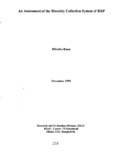| dc.contributor.author | Banu, Dilruba | |
| dc.date.accessioned | 2019-11-20T10:24:54Z | |
| dc.date.available | 2019-11-20T10:24:54Z | |
| dc.date.issued | 1999-12 | |
| dc.identifier.citation | Banu, D. (1999, December). An assessment of the biweekly collection system of RDP. Research Reports (1999): Economic Studies, Vol - XIV, 216–239. | en_US |
| dc.identifier.uri | http://hdl.handle.net/10361/13045 | |
| dc.description.abstract | The present study intended to assess the effects of the biweekly collection system of
RDP on both the BRAC staff and the programme participants. Data were derived from
eight VOs as well as three AOs selected randomly. Findings indicated that the
biweekly collection system saves time of both BRAC staff and VO members for
attending VO meetings. Members' attendance in collection meeting increased.
Apparently the intensity of members' involvement in income generating activities also
increased. The biweekly system reduces the operation cost of the credit programme of
BRAC's RDP as it needs less staff for instalment collection. On the contrary, in the
new system the size of loan instalment is big and it keeps the members always under
pressure for managing money. It increases the tension of the BRAC staff to check the
chance of overdue or partial repayment of loans by the VO members every month.
Dependency on husband increases for using loans and repaying instalments, as
members are prone to greater risk paying a double amount as instalment every two
week. The biweekly system focuses more on the households' economy rather than
meeting interests of the VO members towards their empowerment. Members accepted
the biweekly collection system only as BRAC wanted to initiate it. | en_US |
| dc.language.iso | en | en_US |
| dc.publisher | BRAC | en_US |
| dc.subject | Biweekly collection | en_US |
| dc.subject | Rural Development Programme | en_US |
| dc.subject | BRAC | en_US |
| dc.subject.lcsh | Rural development--Bangladesh. | |
| dc.title | An assessment of the biweekly collection system of RDP | en_US |
| dc.type | Research report | en_US |

